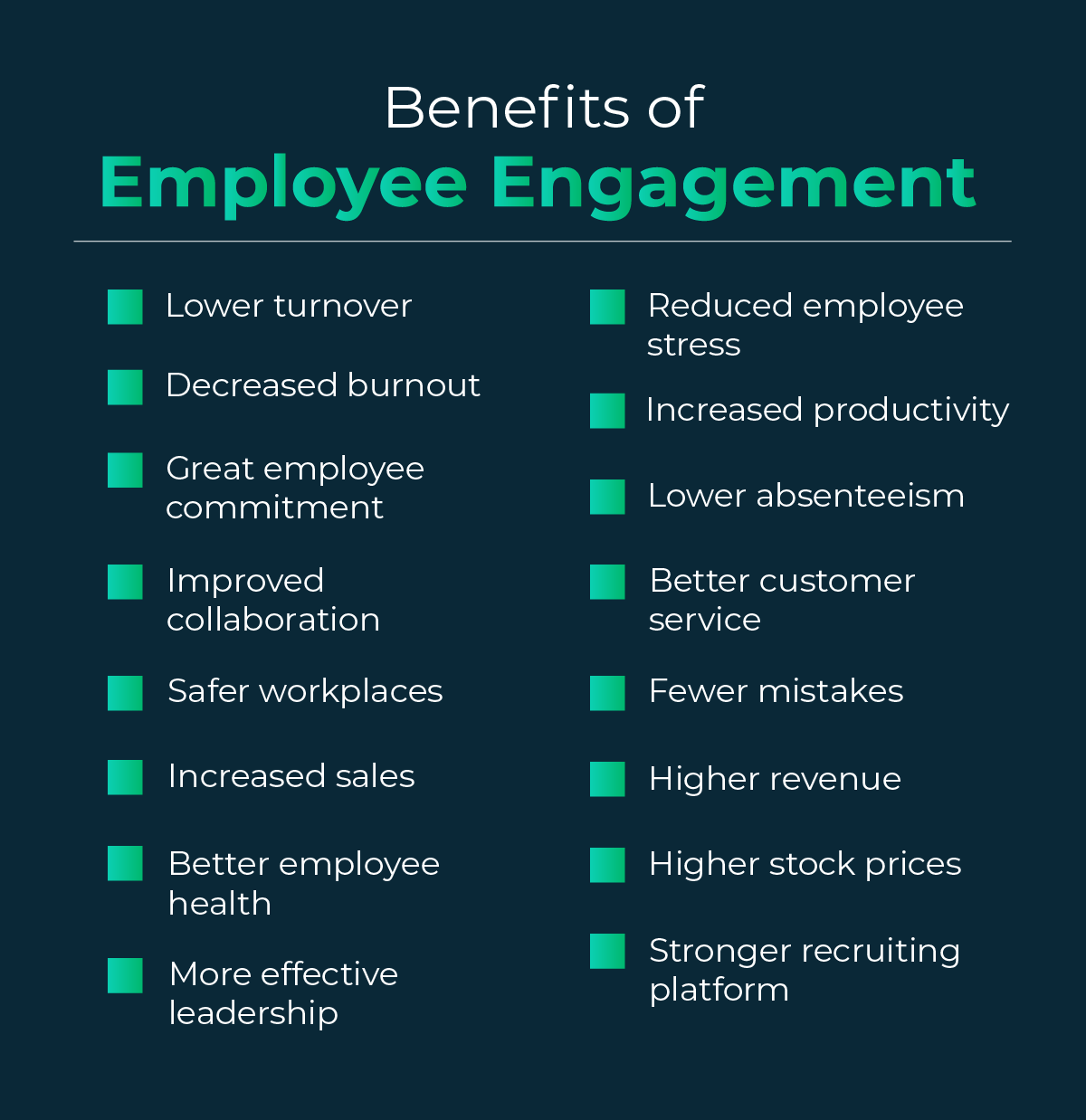Why Employee Engagement Is Important in Today’s Workplace: 16 Benefits

- Benefits of Employee Engagement
Many companies today report that they prioritize engagement or regularly survey their employees to track their satisfaction. But in reality, employee engagement is in crisis.
This year, the U.S. employee engagement rate dropped to a dismal 34%, according to Gallup, marking the first decrease in a decade. Managers and healthcare workers experienced the most precipitous drop, which is likely to impact many companies’ output. It’s essential to be clear on why employee engagement matters to understand the potential impacts of this trend.
Benefits of Employee Engagement
The benefits of employee engagement are surprisingly broad, ranging from workplace safety to share prices. Many of these factors are interconnected, making employee engagement a powerful predictor of an organization’s success.
Employee engagement benefits include the following.
1. Lower Turnover
Employees who aren’t engaged with their work are likely to look elsewhere. And since it costs one-half to twice an employee’s annual salary to replace them—not to mention the less tangible impacts on staff morale and productivity—focusing on employee engagement can produce major cost savings for organizations.
2. Reduced Employee Stress
Less engaged employees are likely to feel more stressed, and stress decreases engagement, creating a vicious spiral that can be hard to break. Stress costs American businesses $300 billion a year, according to the American Institute of Stress. So reducing stress and increasing engagement pays dividends, showcasing another reason why employee engagement is important.
3. Decreased Burnout
Low engagement and unchecked stress can lead to burnout, a state characterized in part by a lack of motivation and inability to connect with one’s work. According to McKinsey & Company, a startling 49% of workers reported at least some level of burnout in April 2021. Improving employee engagement can help keep employees from reaching that state, from which it can be difficult to recover.
4. Increased Productivity
It’s no surprise that employees who feel engaged with their work put in more effort, and their companies reap the rewards. Engaged workforces are 17% more productive, according to Gallup, which has major implications for both the profitability and longevity of the organization.
[READ: Explore 15 employee engagement ideas.]
5. Greater Employee Commitment
In addition to increased output, engaged employees are in general more committed to the future of their organization. That means they are more likely to put time and energy into tasks that aren’t as easy to measure but that have a big impact. These may include training new employees and developing more efficient processes.
6. Better Customer Service
Engaged employees are more aligned with the company’s mission and goals, meaning their customer interactions are more on-brand. Plus, customers are likely to see their positivity about the organization. Engagement is directly linked to improved customer experiences and can also increase customer loyalty over time.
7. Improved Collaboration
Employees who feel connected to their company and their teammates are more likely to feel a sense of camaraderie and to collaborate effectively with their colleagues. This, in turn, promotes engagement among their peers, creating a positive cycle.
8. Lower Absenteeism
Absenteeism can seriously strain a company’s ability to perform its mission. According to Gallup, companies with high engagement have 81% lower absenteeism than companies with low engagement. This is a difference with a clear impact on productivity and outcomes.
9. Safer Workplaces
Workplace accidents can have tragic consequences and pose a huge reputational and financial risk for organizations. Since engaged employees tend to pay closer attention to their work and feel more empowered to speak up about concerns, they are less likely to take risks that can lead to injury. That’s why companies in the top quartile for engagement have a whopping 70% fewer accidents than companies in the bottom quartile.
10. Fewer Mistakes
On a similar note, disengaged employees are also more likely to make costly mistakes in their work. If your staff doesn’t feel committed to the organization and their roles, they aren’t as likely to go the extra mile to ensure their work is perfect.

11. Increased Sales
Engaged employees are more productive and more likely to build strong customer relationships, which translates directly to 20% higher sales. That’s a figure that can easily make or break a company.
12. Higher Revenue
Higher sales and productivity, paired with reduced expenses from turnover and employee mistakes, naturally lead to revenue increases. Gallup found that highly engaged companies are 21% more profitable than their less-engaged competitors.
13. Better Employee Health
Employees who are disengaged with their work are more likely to suffer from negative physical and mental health, which can further decrease productivity and increase an organization’s costs. Employees who feel positive about their jobs, on the other hand, are more likely to experience increased well-being and have energy for wellness-promoting behaviors like exercise.
14. Higher Stock Prices
All of the productivity and employee morale benefits of high engagement pay off for shareholders, too. Among publicly traded companies, those with the highest engagement show 147% higher earnings per share than their less engaged competitors, according to Gallup.
15. More Effective Leadership
Employee engagement is often transmitted from the top down. In fact, employees’ perceptions of their managers can account for up to 70% of differences in engagement, Gallup found. That means that when managers are highly engaged, their positive relationship with the company can have outsized impacts on overall performance.
16. Stronger Recruiting Platform
Highly engaged employees are great for attracting customers—but they’re also a powerful recruiting tool. Happy employees are more likely to spread a positive message about their company among their network. And job seekers who perceive high levels of engagement are more likely to develop a positive impression of a potential employer.
Given the many benefits of employee engagement, companies that prioritize health and happiness in the workplace are likely to experience positive outcomes across the board. Ultimately, engaged employees are a powerful tool to raise revenues and position the company for many years of success.
Are you working to improve employee engagement? One of the most powerful ways to keep employees invested in your company is to demonstrate commitment to their development. Contact Emeritus Enterprise today to learn how we can build online employee training programs that grow your employees’ skills while increasing engagement.


